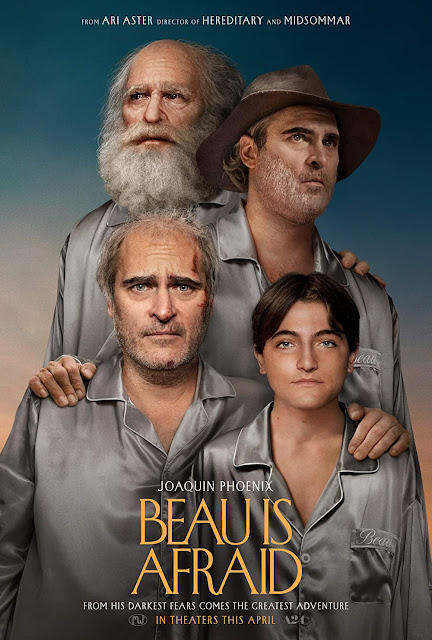This week at Lincoln Center, I attended a special screening
of Ari Aster’s new comedy-horror, “Beau Is Afraid”,
starring Joaquin Phoenix.
Synopsis
When a man tries to attend his mother’s funeral, he sets out
on an odyssey that will change his view of the world forever.
Story
Beau (Phoenix) is set to fly to his mother’s for a family
get-together – but after a non-stop series off chaotic events, he is forced to
cancel his trip. Shortly thereafter, he
learns that his mother has passed away under some rather unusual circumstances;
now, he is forced to make the trip to attend her funeral – and as her only son,
he must deliver the eulogy as well.
Following yet another unforeseen accident, he is taken in by a surgeon
and his wife (Nathan Lane and Amy Ryan) who dedicate themselves to nursing him
back to health. Although the surgeon
offers to drive him to his mother’s house, this plan goes awry when some
urgent surgeries are scheduled.
Once he’s meant to feel unwelcome in their home, Beau leaves
and tries to see if he can somehow make his way to his mother’s in time for the
funeral (which has already been pushed back because of his lateness). Getting lost in the woods, he’s “adopted” by
a group of strangers who live there and put on stage shows on a regular
basis. The stage show that appears this
night is one into which Beau is immediately drawn into emotionally; he sees how
much different his life would have turned out to be had he only made different
choices in his life. He suddenly has
flashbacks to his youth where he is reminded of the warped relationship he had
with his mother, not to mention missed opportunities for romance.
When he’s forced to leave this group, he hitchhikes his way
to his mother’s expansive house. It
turns out he’s too late – the funeral is long over and everyone has left quite
some time ago. But all is not lost –
coming to pay her respects is Elaine (Parker Posey), Beau’s long-lost love who
apparently never forgot Beau and his mother when they met during a
vacation. When their unplanned tryst takes
an unfortunate turn, something happens that causes Beau’s perspective of his mother to
be altered permanently – and not for the better. Despite this, can Beau finally resolve these
conflicts and move on with his life?
Review
“Beau Is Afraid” is a very controversial motion picture –
and deservedly so. Perhaps the best way
to begin a review would be to share with you the following reaction to it which
recently appeared on Twitter:
Just left a screening of “Beau Is Afraid.” Before credits started rolling 1 guy in audience stood up and yelled “I better not hear a single person f***ing clap.” Another dude screamed “that’s the worst movie I’ve ever seen.” A girl yelled “total piece of shit”#BeauIsAfraid
— The Noise FM (@thenoisefm) April 14, 2023
If you are on Twitter (despite its recent credibility
meltdown), it might be a good idea to read that entire thread; it’s rather
interesting to see the strong reactions some people are having to this movie.
Aster has gone on record as saying that with “Beau Is Afraid”,
he may have created a new genre of film called The Nightmare Comedy. After seeing this movie, it seems clear that
it’s a nightmare, but you’d really have to dig hard to find the comedy
parts. This was screened in a theater
that was nearly packed and to be sure, there was a section of audience members
that were laughing hard at portions of the motion picture – the only thing is
that it seemed to be a group from the same area of seats and they were mostly
all sitting together. Make of that what
you will. To be sure, “Beau Is Afraid”
is most definitely not for everyone.
Many of the criticisms that have been voiced include the
fact that at three hours the movie is too long.
No argument here. It has also
been accused of being self-indulgent, which partially accounts for the
length. Again, agree with this
observation. In the post-screening
interview, Aster seems to encounter immense difficulty explaining the film or
his choices or himself, for that matter.
When you hear such hesitancy from the filmmaker, it suggests that he’s
not well thought-out on the project.
Having said that, there does appear to be a staunch community of
cinephiles that laud “Beau Is Afraid” as a great work of art and they look
forward to a second viewing.
Writer/Director Ari Aster was brave enough to participate in
an interview following the screening. Aster
said that he wanted to create a world in which the protagonist felt as if he
was trapped in a hall of mirrors, seeing reflections that were occasionally
distorted. The director kept wanting to
move the story from humor to horror and back again, while keeping Beau a
relatable character. He intended for Beau’s
mother to be THE mother – in other words, he wanted her to be seen like a God
(at least to Beau). Aster wanted this character
to be about either the fear of who your mother might be or what she might turn
into.










